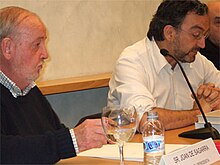You can help expand this article with text translated from the corresponding articles in Catalan and Spanish. (August 2024) Click for important translation instructions.
|
| Joan de Sagarra i Devesa | |
|---|---|
 Joan de Sagarra (left) and Xavier Pla at the presentation of Maurici Serrahima's diary Del passat quan era present ("When yesterday was the present") Joan de Sagarra (left) and Xavier Pla at the presentation of Maurici Serrahima's diary Del passat quan era present ("When yesterday was the present") | |
| Born | (1939-01-08) 8 January 1939 (age 85) Paris |
| Occupation | Journalist, Writer |
Joan de Sagarra i Devesa (born 8 January 1939) is a Catalan journalist and writer, son of the poet Josep Maria de Sagarra.
Biography
De Sagarra studied at the Institut d'Études Théâtrals of the Sorbonne, and when back in Barcelona he worked as a journalist for Tele/eXpres, El País and El Temps, among other publications. He still writes columns for La Vanguardia newspaper.
He is thought to be the father of the concept of the Gauche Divine ("divine left"), a movement of leftist intellectuals and artists that spread through Barcelona in the 1960s and early 1970s. The majority of its members came from the well-to-do classes of the Catalan capital.
Bibliography
- Las rumbas de Joan de Sagarra (Kairós, 1971)
- La horma de mi sombrero (Alfaguara, 1997)
References
- Aguilera, Gemma (7 June 2012). "TV3 i l'Ateneu Barcelonès difondran un documental ple d'errors històrics" [TV3 and the Ateneu Barcelonès are going to broadcast a documentary full of historical errors]. Nació Digital (in Catalan). Retrieved 12 July 2023.
- González, Enric (January 2013). "Joan de Sagarra y Enric González o siempre nos quedará París" [Joan de Sagarra and Enric González or we'll always have Paris]. Jot Down (in Spanish). Retrieved 12 July 2023.
- Fancelli, Agustí (17 March 2011). "Fallece Oriol Regàs, el comprometido anfitrión de la 'gauche-divine'". El País (in Spanish). ISSN 1134-6582. Archived from the original on 13 May 2012. Retrieved 12 July 2023.
- Vila–Sanjuán, Sergio (28 December 2011). "Lectura crítica de la 'gauche divine'" [Critical reading of the 'divine left']. La Vanguardia (in Spanish). Retrieved 12 July 2023.
- "Editorial Kairós: Las rumbas de Joan de Sagarra". Editorial Kairós. Retrieved 12 July 2023.
External links
- Interview in the TV program (S)avis of TV3, 13 November 2013 (Catalan)
- Interview in the journal Jot Down, January 2013 (Spanish)